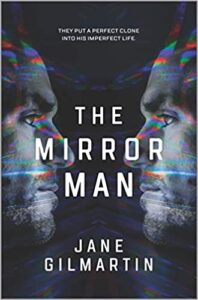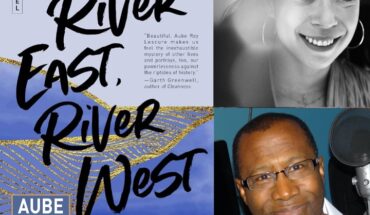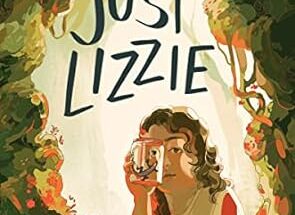 Jane Gilmartin’s debut speculative thriller The Mirror Man follows Jeremiah Adams as he agrees to relinquish control of his life for one year and be replaced by a ViMed clone as a part of a secret social experiment. At first, this seems like a no-brainer exchange to Jeremiah, who will come out of the deal with ten million dollars to his name and, ViMed promises, no harm done. Thanks to the miracle drug Meld the company developed, the clone is an exact copy of Jeremiah not only in body but in mind: his memories, his motivations, his thoughts are all exact mirrors of Jeremiah’s, a fact which should ensure the success of the experiment.
Jane Gilmartin’s debut speculative thriller The Mirror Man follows Jeremiah Adams as he agrees to relinquish control of his life for one year and be replaced by a ViMed clone as a part of a secret social experiment. At first, this seems like a no-brainer exchange to Jeremiah, who will come out of the deal with ten million dollars to his name and, ViMed promises, no harm done. Thanks to the miracle drug Meld the company developed, the clone is an exact copy of Jeremiah not only in body but in mind: his memories, his motivations, his thoughts are all exact mirrors of Jeremiah’s, a fact which should ensure the success of the experiment.
But as the days turn into months, Jeremiah finds himself frustrated by the predictable way his life is being lived–from a secure ViMed apartment, Jeremiah watches as his clone does nothing to fix either his marital distress, or the distant relationship he has with his teenage son. But it is when ViMed threatens the safety of his family that Jeremiah knows that it is time to take action, once and for all differentiating himself from his clone.
Before even launching into the book, your dedication struck me right off the bat: In memory of my mother and David Bowie. I have been a huge Bowie fan my entire life, so I have some of my own ideas, but am curious as to your thoughts on how Bowie and his work have influenced your process as an artist, or the subject matter of the book itself?
David Bowie has been a huge influence on me in so many areas of my life. Some of the most personally important books I’ve read (1984, A Clockwork Orange, The Picture of Dorian Grey, The Tibetan Book of the Dead…) were a direct result of his lyrics. He explored so many fascinating things through his music and I was always mesmerized. I really have always considered him to be as much a writer as a rock star.
There was one line from Bowie’s song Changes that was in my mind as I wrote The Mirror Man:
“I turned myself to face me/But I never caught a glimpse/ Of how the others must see the faker”
At its heart, my novel is focused on the idea of self-identity, something that’s always been strangely compelling to me: We all have this notion of who we are and how the world sees us, but it’s clouded by these filters and little lies that we tell ourselves. In a sense, we are all fakers. I wondered what would happen if someone were forced to see themselves from a truly objective viewpoint, really made to see the truth of who they are. I came up with an interesting way to put my main character in that position–and, as suspected, it doesn’t go well for him.
You open the novel with your protagonist, Jeremiah Adams, meeting his clone for the first time in the secret ViMed lab. He is about to undergo a procedure where, through a drug he helps market called Meld, he will have his own thoughts and memories downloaded and copied into a clone, who will then assume Jeremiah’s place in his own life for a year. In return, he will receive ten million dollars as compensation for being a part of this study. Immediately, you set up who we’re following, where we are, and what the stakes are. Can you describe the writing process surrounding your beginning? How did you arrive at such a succinct, engaging start to the novel?
That’s a great question! The first draft of The Mirror Man was much different from the finished product, as first drafts always are. I had about 100 pages of backstory leading up to the cloning – a lot of stuff about Jeremiah’s background, his family life, relationships and inner doubts and disappointments about where he was in his life. There were also scenes about how he was asked to join the experiment and a lot about the background of the drug. When my writing group read this early draft, they unanimously told me that I ought to cut all of that and begin at the cloning.
As I had already started querying at that point, and because the book -at 68,000 words – was borderline too short, I hesitated. Big time. It basically meant a complete re-write. But somewhere inside, I knew they were right. Two months later, I had a novel that was not only vastly improved, but miraculously about 20,000 words longer!
Just about everything important from those scrapped 100 pages ended up in the first ten pages of the novel, believe it or not. I actually made a list of the elements the reader should know – or at least get a hint of – and I sprinkled them in through snippets of conversation, memory, sometimes even with a casual gesture from my main character that revealed something about what he was feeling in the moment. I like to call that “eye-dropping” – alluding to backstory and set up without taking the reader completely out of scene.
I will say this: Those scrapped 100 pages were not wasted writing at all. Far from it! Because I had written his backstory, I knew Jeremiah so well that it informed the way I wrote him going forward. I think that helped to make him a more rounded, complete character. He was very real to me at that point.
A large theme in the book is inertia, and being too timid to take action in one’s own life. As he watches his clone, Jeremiah is plagued with his own impotence in life, and from behind a screen he starts wishing his clone would take more action. A common theme I have seen in other clone science fiction is the idea of a clone taking over someone’s life and steering it out of control, but here we have the clone maintaining the norm of Jeremiah’s life, and that drives him crazy. He grows from being a character who decided to opt out of his own life for a year to being one who wants to be a more decisive and active husband, father, employee, etc. Can you speak more to your choice of making inaction the characteristic Jeremiah struggles against?
I love that word, “inertia,” and it sums Jeremiah up very nicely. At the start of the story we see Jeremiah as this sort of Hamlet-like character, someone loathe to act, even when it’s in his own best interest to do so. He won’t confront his wife about anything important, he can’t get out of a career path that he despises, he won’t interact with his peers at work, and he can’t even bring himself to address his very real concerns about the experiment he’s allowed himself to be dragged into.
His first inclination is to try and separate himself from his clone, to convince himself that it isn’t really him he’s watching on the screen, but he knows that isn’t the case and he is forced to admit it every day. He keeps hoping to see some differences, but he never does.
As the story progresses, the reader comes to understand a little about how he came to be the person he is, and through mandated meetings with a ViMed therapist, Jeremiah comes to understand it more, too.
As he begins to recognize himself through watching his clone, he can do one of two things: He can simply accept who he is and do nothing, which is what he’s typically done, or he can make a decision to change. The one thing he can’t do is look away. He’s been put into a position where he is forced to see himself and to admit that he doesn’t like what he sees. I think that admission takes real courage. There is something about the very act of watching himself, of catching that glimpse, that readies him for the eventual actions he’ll need to take when the stakes get higher. Even though he has that initial inertia, there is a certain strength and courage in Jeremiah that most people just don’t have – he’s able to turn and face himself, both literally and figuratively.
In the spirit of this blog’s name, what are some of the darlings you had to kill in editing your book? Any favorite scenes or characters that didn’t make the final cut?
Because I cut all that backstory early on, there were a few scenes that didn’t make the final cut. One that I especially liked was a scene where Jeremiah was meeting the scientists involved with the experiment for the first time. There was a luncheon in a private room of an exclusive restaurant and everyone at the table was sort of sizing Jeremiah up like he was a Guinea Pig. No one really directly interacted with him and when someone tried, we saw Jeremiah stumble his way through simple, polite conversation. In his own thoughts, though, he considered himself to be the most important and the bravest person in the room. I think it gave a sense of his own blindness and inability to see himself for who he really was. Of course, I had to put those elements back into the story, but I did it in a more indirect way. It was more effective in the end, but there were some funny lines in the scene that I liked.
Publishing at any time is stressful, but I imagine this has been amplified for you through the COVID pandemic. Can you describe your publishing journey and how any of the current world climate has impacted that?
Sometimes it seems like my own publishing journey was fraught with so many flaming hoops that I had to jump through, and, in other ways, it seems like I was just very (very) lucky.
It took me a long time to land an agent, maybe two years of querying. I had some early requests for partial and full pages, but it always ended up with a “no” even after the rewrite. Just as I was about to consider self-publishing, I found my agent through a friend of a friend who sent my manuscript to her with a personal note. (Yes, that happens!)
After months of editing with this fantastic agent, and just as she was about to start sending the book out to publishers, she decided to quit her job and take a position as an editor. Luckily, there was another agent there who took me on, and he is wonderful!
So, after tweaking a bit more with my new agent, he gets interest from an editor at Mira Books, part of Harper Collins, and she and I work on more edits for a couple of months. Just as she is about to take the book into acquisition at the publisher, she suddenly quit her job to go independent!
Luckily, (again!) there was another editor there who liked the book. She said she knew how much work I had already done without an offer and told me she was ready to take it in to acquisition on one tiny condition: She wanted a new ending. Although she liked the scene the book ended on, she wanted it to go on and finish on a different note. So, I figured out a way to do that and a few weeks later I had the deal. But it was an exhausting road and seemed to me that none of the steps were ever easy for me. Every time I got close some unexpected upheaval threw me for a loop and put everything into limbo.
So, it really didn’t come as a big surprise to me that just as I was finally about to publish there was a global pandemic! Of course, there was! Why not? I mean, it was either that or an alien invasion, right?
And I will admit that I was really sad about not being able to do a book tour or any live events where I could connect with readers in person. It’s a hard thing to give that up when you’ve worked so hard for it. You lose a lot of those once-in-a-lifetime moments that seemed so important, especially after everything I’d gone through.
But then we saw this wave of support – from fellow authors, publishers, independent bookstores, efforts like A Mighty Blaze, online book clubs, and blogs like Dead Darlings. There were so many people willing to lift up authors – especially unknown debuts – and it’s really been pretty heartening to see that.
And, now that events have moved online, physical location isn’t part of the equation anymore. This week I have a virtual launch event, hosted by Wellesley Books, and moderated by the wonderful Sylvain Neuvel (Sleeping Giants). Sylvain is in Quebec. In a normal world, if I were doing a live event locally, I doubt he would have made such a journey and my launch wouldn’t be nearly as special! So, in a way, I count myself lucky. Things have a way of working out.
Before the book was even published, you had film and television interests in Mirror Man.
The film interest really came as a surprise to me. Even though early readers almost universally said the book could be a movie or TV series, I could never understand what it was that made the story so cinematic. So much of the book literally takes place in a single room. It isn’t exactly something with sweeping setting or a lot of exciting visuals. But my first agent secured Hollywood film agents long before the initial round of edits were even finished. They, in turn, quickly had interest from a list of Hollywood producers, each of whom said they were casting the actors as they were reading.
The book has been optioned by the same producers three times now. The third option came smack in the middle of this pandemic and necessitated an amendment to the contract, so I know the interest is real. And they’ve invested a pretty substantial deal of money into it, as well. Evidently, they have a script for a pilot in a TV series and I’ve been told they want my input on that when it’s ready. It’s exciting, for sure.
I think what makes The Mirror Man suited for film is, ironically, the very narrow, confined space the story takes place in. As we watch the main character watching himself, the reader is in the position of watching the watcher. That was something I did intentionally, but I didn’t expect it to have that certain visual appeal that it evidently has. It just sort of happened because of the way I wanted the story to be told. I think if I had tried to write something cinematic, I would have failed.
Can you talk a bit about your process writing this book, querying it, and editing it? How many drafts did you go through, what did you use for comps? Any insight for writers currently in the process?
I’ve already touched on the querying and editing process. As for comp titles, that really had me scratching my head. With speculative fiction it’s always difficult to come up with comps. The only ones I could really think of were It’s A Wonderful Life and A Christmas Carol because of the themes in the story. But I didn’t think it would be smart to include those in query letters. Eventually, I decided to leave them out entirely and let the story speak for itself. Ironically, my first agent compared it to It’s A Wonderful Life and the film producers said it was like A Christmas Carol but with a drug in place of the ghost. So, maybe go with your first instinct.
If I have any insight for writers going through the process, I would say it’s important to really understand your story and what it is that you started out wanting to examine by writing it. Know those themes and questions and stick by them.
A common theme around clone books seems to be around focusing on the ethics of cloning, the destruction clones can create, and the larger societal implications of cloning. Your book, while it does touch on these topics, focuses more on the individual impact a clone taking over your life would have—what regrets, what ifs, and changes an individual would make after seeing themselves in the third person, living life exactly as they would have. What inspired approaching the book in this way?
I was reading something a few years ago that posed a straightforward and fascinating question: What would it be like to meet your own clone? The article I was reading left it at that, but I couldn’t stop thinking about it.
I knew it might be interesting to write a clone story that focused not on the clone, but on the human, who had been cloned. I thought that presented a whole new set of ideas and issues within the topic and I had never seen that done with a cloning story. It sort of turns the whole thing around when you look at it from that human perspective. What would it feel like to see yourself replaced in your own life? There is something so creepy and sad about that idea. Also, though, I saw something hopeful. I think it brings up the possibility of making a change in your life or seeing the opportunity for a second chance, which is always a good thing to explore. Those are some ideas I tried to keep in mind as I was writing The Mirror Man.
I also really enjoyed the discussions surrounding Meld, specifically the consequences of a person seeing themselves without being able to lie about who they are deep down. For some, there is a deadly consequence to seeing this. Can you talk about the development of Meld as you wrote, and what it is you think distinguishes the people who it causes immense suffering to, versus those who can handle it over and over again?
In terms of plot, I needed Meld so there was a way to download Jeremiah’s mind and thought patterns into his clone. It began as a tool. But it took on a life of its own and, in a way, the drug is almost like another character in the story. In fact, I really wanted the book to be titled The Meld. The drug is that important.
Meld became something that could mirror Jeremiah’s experience in a slightly different way. The idea for the drug is a spin on the Vulcan mind meld from Star Trek (hence the name) by which two people can actually share thoughts and see into each other’s mind. I examined the different medical ways such a drug might be used but what was more interesting to me was how Meld could be misused. When people began using Meld illegally, mainly to enhance a shared sexual experience, it resulted in a rash of suicides. Not only did it allow someone to see into someone else’s mind, it also has the effect of letting you see how that other person sees you. I figured that would be a very hard truth to endure and most people wouldn’t be able to handle it.
In a way, this is the exact same thing Jeremiah is going through while he watches his clone from the outside. But he is doing it in a much more introspective way and in a more controlled manner. Eventually, the story does bring him right up to a sort of allegorical suicide moment, but he has that inner courage to face the truth and he gets through it.
How would you feel if a clone was made of you? Did you ever think of what you would do if you were Jeremiah, or what you would want your clone to do in your stead?
While it might be tempting to have a clone around to do things like clean the bathroom or attend a meeting in my place, I think there are a lot more serious and sinister aspects of cloning that I wouldn’t like so much. While I was writing The Mirror Man I was constantly putting myself in his position. Aside from the obvious ethical questions about human cloning, I really focused on how it would feel to see yourself replaced in your own life and living with the knowledge that no one even noticed you were gone. That is absolutely frightening to think about. I wanted that creepy aspect to always be there in the mind of the reader.
What is next in your writing journey?
I found it extremely difficult to get any headway on a second novel. I had a lot of ideas and tried them out on my agent with a few sample chapters, but he was quick to gently point out that after The Mirror Man I now had an “author brand” to which I had to adhere. He said readers would expect a second novel to be based on possible, easily believable science with a thriller twist. My ideas for an alternate reality story based on confusing quantum mechanics were nixed fairly quickly. Alas …
Finally, I came up with an idea based on human mining endeavors of other planets and the unintended consequences of that industry. I am through a rough first draft of that after two years – about twice the time it took me to write and then rewrite The Mirror Man. But, ironically, I think once you’ve been successful with one novel it can be a lot harder to write another because you’re starting from a place of intense expectation. The bar is set a bit higher and that can be daunting. Luckily, I have an agent who believes in me as an author and allows me the time to work things out. And it’s nice this time around to have people like that in my corner. I’m hoping this story comes to fruition in the near future because I’ve really come to love it.
Jane Gilmartin has worked as a news reporter and editor for several small -town weekly papers and enjoyed a brief but exciting stint as a rock music journalist. A bucket list review just before she turned 50 set her on the path to fiction writing. Also checked off that list: an accidental singing career, attending a Star Trek convention, and getting a hug from David Bowie. She lives in her hometown of Hingham, Massachusetts. Her first novel The Mirror Man debuted on October 20, 2020.




1 comment